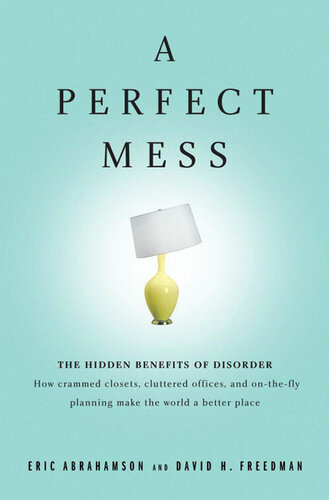
A Perfect Mess
The Hidden Benefits of Disorder--How Crammed Closets, Cluttered Offices, and on-the-Fly Planning Make the World a Better Place
کتاب های مرتبط
- اطلاعات
- نقد و بررسی
- دیدگاه کاربران
نقد و بررسی

October 16, 2006
The premise of this pop business book should generate reader goodwill—who won't appreciate being told that her messy desk is "perfect"? But despite their convincing defense of sloppy workstations, Columbia management professor Abrahamson (Change Without Pain
) and author Freedman (Corps Business
, etc.) squander their reader's indulgence by the end. Their thesis is solid enough: that organizational efforts tend to close off systems to random, unplanned influences that might lead to breakthroughs. But too many of the book's vaguely counterintuitive examples—to cite just one, that Ultimate Fighting is actually less injurious than boxing—stray from the central theme, giving their argument a shapeless, meandering feel. The authors prefer sprawling Los Angeles to fastidiously designed Paris and natural landscaping to lawns, decry clutter consultants, tight scheduling and "the bias towards neatness programmed into most of us." Noting that "organizations can be messy in highly useful ways," they urge companies to scrap long-term strategic planning, make contracts flexible and relinquish control over some processes. The advice is good and the arguments intriguing, and the book will probably be widely cited by those who have always resented neatniks. Too bad it's, well, such a mess.

November 1, 2006
Business and science journalist Freedman teams with Abrahamson (management, Sch. of Business, Columbia Univ.; "Change Without Pain") to pen a book that scores of "messy" people will embrace. From books like Stephanie Winston's "The Organized Executive" to popular reality shows like "Mission: Organization" (HGTV), the message that clutter is bad and that a neat and orderly life is the way to success and happiness is today the accepted norm in American culture. The authors propose a different hypothesis, demonstrating that in many instances messy systems are actually much more cost-effective and productive than highly organized ones. Drawing on case studies and anecdotal accounts, the authors recount numerous examples wherein messiness yields more creativity, new discoveries, an element of surprise, superior multitasking ability, and the ability to respond more quickly to changing circumstances. The engaging and refreshing alternative views they offer make this a book of interest to public libraries and universities with popular business collections. [See Prepub Alert, LJ 9/15/06.]Crystal Renfro, Lib. & Information Ctr., Georgia Inst. of Technology, Atlanta
Copyright 2006 Library Journal, LLC Used with permission.

November 15, 2006
Flying utterly in the face of conventional wisdom, the authors turn the world of organization on its head to examine how messy systems can be more effective than highly organized ones. Neatness for its own sake, they say, not only has hidden costs in terms of man-hours that could be spent doing other work but it turns out that the highly touted advantages may not even exist. More loosely defined, moderately disorganized people and businesses seem to be more efficient, more robust, and more creative than the obsessively neat. As examples, the authors cite a hardware store crammed to the gills with every sort of product in seemingly disorganized fashion that does twice the business of the "neat" one down the block; a grade school where the students are allowed random access to learning materials with no structured lessons, and no discipline problems; and the seemingly chaotic life of Arnold Schwarzenegger, who refuses to make appointments and sees everyone on the fly. The chronically messy will revel in the anecdotes but may need to skip the terminology.(Reprinted with permission of Booklist, copyright 2006, American Library Association.)

























دیدگاه کاربران